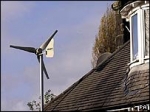This coming week, the good and great from around the world will meet in Nairobi to evaluate their progress on fighting climate change and plan what comes next.
A little closer to home, a coalition of British NGOs is organising a rally to urge UK ministers to reduce national emissions by 3% every year.
The government response to this NGO pressure has been cautious. While a 3% reduction sounds reasonable, it becomes harder when both population and the economy are growing. Rising incomes and rising numbers means more homes, more travel, more consumer goods, more communication. Ministers, already worried about international competitiveness and jobs, don't want to take unilateral action if it puts British companies at a disadvantage against overseas rivals.
But they should not be too cautious. We need to cut emissions by 60% by 2050 in order to stave off the worst effects of climate change. Standing still is not an option; we need to transition to a low-carbon economy. The majority of big corporations around the world already accept that emissions must be cut- they're just waiting for a clear and stable regulatory framework so they can make rational long-term decisions. Companies like GE, Virgin, and HSBC have shown that they can find creative ways to reduce CO2 emissions while growing their business. Let's encourage them to do more.
In the days after November 4th, the UK and governments around the world have an opportunity to reaffirm their commitment to the Kyoto Protocol and set a clear timeline for the next round of global CO2 emissions reductions targets.
And all of us can also reaffirm their commitment to a low-carbon lifestyle by redudcing our own carbon footprint - through reductions at home and offsets for what remains.
Let's make the 4th of November a day to remember.
(*With apologies to Guy Fawkes.)
(Carbon Clear homepage)


